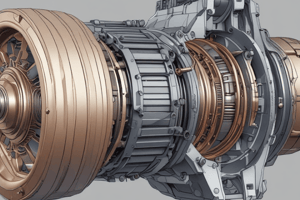Podcast
Questions and Answers
What component is used to minimize the ripples in the D.C output for the induction motor?
What component is used to minimize the ripples in the D.C output for the induction motor?
- Thyristor bridge
- L.C filter (correct)
- Transformer
- Slip ring
A.C must be left connected while feeding D.C to the stator of the induction motor.
A.C must be left connected while feeding D.C to the stator of the induction motor.
False (B)
What is the purpose of the braking thyristor controller in the system?
What is the purpose of the braking thyristor controller in the system?
To control the dynamic braking of the induction motor.
The DC output from the thyristor bridge is fed to the _______ of the induction motor.
The DC output from the thyristor bridge is fed to the _______ of the induction motor.
Match the components with their functions:
Match the components with their functions:
Which of the following statements about the 3-phase slip ring induction motor is correct?
Which of the following statements about the 3-phase slip ring induction motor is correct?
What happens to the input A.C voltage when it is fed into the thyristor converter?
What happens to the input A.C voltage when it is fed into the thyristor converter?
What is the value of the initial braking current calculated?
What is the value of the initial braking current calculated?
The thyristor converter must have a higher voltage rating when the input A.C voltage is stepped down.
The thyristor converter must have a higher voltage rating when the input A.C voltage is stepped down.
What is the formula used to calculate the initial braking torque?
What is the formula used to calculate the initial braking torque?
The speed difference $N_{speed}$ when the speed is 940 r.p.m. is equal to ___ r.p.m.
The speed difference $N_{speed}$ when the speed is 940 r.p.m. is equal to ___ r.p.m.
Match the following variables with their respective values:
Match the following variables with their respective values:
What occurs during regenerative braking?
What occurs during regenerative braking?
During rheostatic braking, the stator winding is connected to an AC supply.
During rheostatic braking, the stator winding is connected to an AC supply.
What happens when the rotor speed falls to synchronous speed during regenerative braking?
What happens when the rotor speed falls to synchronous speed during regenerative braking?
Rheostatic braking involves disconnecting the _____ winding from the AC supply.
Rheostatic braking involves disconnecting the _____ winding from the AC supply.
Match the braking methods with their descriptions:
Match the braking methods with their descriptions:
What is the relationship between rotor speed and synchronous speed during regenerative braking?
What is the relationship between rotor speed and synchronous speed during regenerative braking?
The power returned to the supply during regenerative braking is constant, regardless of rotor speed.
The power returned to the supply during regenerative braking is constant, regardless of rotor speed.
What does negative slip indicate in the context of an induction machine?
What does negative slip indicate in the context of an induction machine?
During regenerative braking, when the load forces the motor to run above synchronous speed, it is in the _____ quadrant.
During regenerative braking, when the load forces the motor to run above synchronous speed, it is in the _____ quadrant.
Which statement describes a benefit of using a current source inverter (CSI) over a voltage source inverter (VSI)?
Which statement describes a benefit of using a current source inverter (CSI) over a voltage source inverter (VSI)?
CSIs have a wider speed range compared to VSIs.
CSIs have a wider speed range compared to VSIs.
What is the main reason the torque-slip relationship of a 3-phase induction motor needs to maintain constant air-gap flux?
What is the main reason the torque-slip relationship of a 3-phase induction motor needs to maintain constant air-gap flux?
The ______ provides the rated motor torque and speed for an induction motor running at 1200 rpm.
The ______ provides the rated motor torque and speed for an induction motor running at 1200 rpm.
Match the following components with their primary characteristics:
Match the following components with their primary characteristics:
At what frequency is the motor operating when determining stator current and torque for rated slip speed?
At what frequency is the motor operating when determining stator current and torque for rated slip speed?
A single CSI can be used to feed multiple motors in parallel.
A single CSI can be used to feed multiple motors in parallel.
What is the rated stator voltage for the Y-connected squirrel cage induction motor described?
What is the rated stator voltage for the Y-connected squirrel cage induction motor described?
The induction motor operates at a speed of ______ when powered with 50 Hz.
The induction motor operates at a speed of ______ when powered with 50 Hz.
Which of the following is a consequence of using a large inductance in the DC link for CSI drives?
Which of the following is a consequence of using a large inductance in the DC link for CSI drives?
What is the total equivalent impedance (Z) of the induction motor?
What is the total equivalent impedance (Z) of the induction motor?
The stator current at full load is 7.21 A.
The stator current at full load is 7.21 A.
What is the synchronous speed of the motor at 30 Hz?
What is the synchronous speed of the motor at 30 Hz?
The full load torque, T, of the induction motor is ______ N-m.
The full load torque, T, of the induction motor is ______ N-m.
Match the following components with their values:
Match the following components with their values:
What is the full load rotor current of the induction motor?
What is the full load rotor current of the induction motor?
The motor speed is 770 r.p.m. when the synchronous speed is 900 r.p.m.
The motor speed is 770 r.p.m. when the synchronous speed is 900 r.p.m.
What does the variable 's' refer to in the context of induction motors?
What does the variable 's' refer to in the context of induction motors?
The equation for the total equivalent impedance Z includes R and ______ components.
The equation for the total equivalent impedance Z includes R and ______ components.
What is the formula to calculate synchronous speed in RPM for an induction motor?
What is the formula to calculate synchronous speed in RPM for an induction motor?
Flashcards
Regenerative Braking
Regenerative Braking
A type of braking in an induction motor where the motor's kinetic energy is converted into electrical energy and fed back to the power source.
Plugging (Reverse Current Braking)
Plugging (Reverse Current Braking)
A braking method for an induction motor where the direction of the current in the stator winding is reversed, causing a braking torque.
Slip (Induction Motor)
Slip (Induction Motor)
The ratio of the rotor's speed to the synchronous speed of the rotating magnetic field.
Slip Speed
Slip Speed
Signup and view all the flashcards
Cage Induction Motor
Cage Induction Motor
Signup and view all the flashcards
Thyristor Controller
Thyristor Controller
Signup and view all the flashcards
LC Filter
LC Filter
Signup and view all the flashcards
Plugging
Plugging
Signup and view all the flashcards
Dynamic (Rheostatic) Braking
Dynamic (Rheostatic) Braking
Signup and view all the flashcards
Negative Slip
Negative Slip
Signup and view all the flashcards
Slip
Slip
Signup and view all the flashcards
Synchronous Speed
Synchronous Speed
Signup and view all the flashcards
Returned Power
Returned Power
Signup and view all the flashcards
Squirrel-Cage Motor
Squirrel-Cage Motor
Signup and view all the flashcards
Current Source Inverter (CSI)
Current Source Inverter (CSI)
Signup and view all the flashcards
Voltage Source Inverter (VSI)
Voltage Source Inverter (VSI)
Signup and view all the flashcards
Squirrel Cage Induction Motor
Squirrel Cage Induction Motor
Signup and view all the flashcards
Variable Frequency Drive (VFD)
Variable Frequency Drive (VFD)
Signup and view all the flashcards
Constant Flux Control
Constant Flux Control
Signup and view all the flashcards
Torque-Slip Relationship
Torque-Slip Relationship
Signup and view all the flashcards
Plugging Torque
Plugging Torque
Signup and view all the flashcards
Plugging Current
Plugging Current
Signup and view all the flashcards
Equivalent Impedance (Z) of an Induction Motor
Equivalent Impedance (Z) of an Induction Motor
Signup and view all the flashcards
Resistance (R) in Induction Motor Impedance
Resistance (R) in Induction Motor Impedance
Signup and view all the flashcards
Reactance (X) in Induction Motor Impedance
Reactance (X) in Induction Motor Impedance
Signup and view all the flashcards
Rotor Reactance (X2) in Induction Motor Impedance
Rotor Reactance (X2) in Induction Motor Impedance
Signup and view all the flashcards
Full Load Stator Current
Full Load Stator Current
Signup and view all the flashcards
Full Load Rotor Current
Full Load Rotor Current
Signup and view all the flashcards
Full Load Torque
Full Load Torque
Signup and view all the flashcards
Study Notes
Topic: Electrical Drives
- Electrical drives convert electrical energy to mechanical energy. They are used to control the motion of machinery.
Topic: Components of Electrical Drives
- Load: The equipment or mechanism being driven.
- Motor: The source of mechanical power.
- Power modulator: Adjusts the power flow to the motor.
- Control unit: Controls the power modulator to adjust the motor speed.
- Source: The electrical supply source.
Studying That Suits You
Use AI to generate personalized quizzes and flashcards to suit your learning preferences.
Related Documents
Description
This quiz covers key concepts related to the control and braking systems of induction motors. It includes questions on components like thyristor converters, braking current calculations, and the functions of various motor parts. Test your understanding of these essential topics for effective motor operation.




